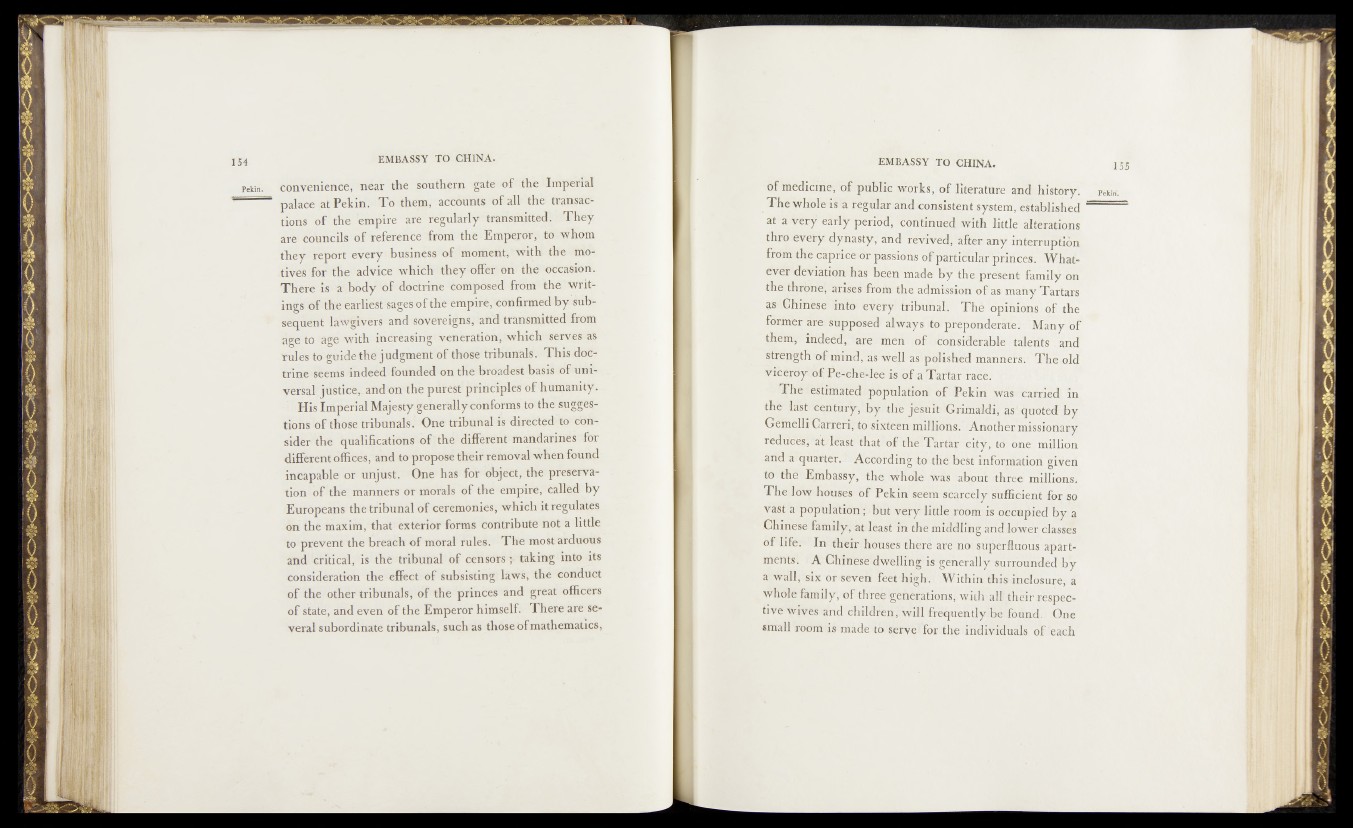
convenience, near the southern gate of the Imperial
palace at Pekin. To them, accounts of all the transac-
tions pf the ’empire-are regularly Transmitted,
are Councils of reference from the Empejor, to whom
th eÿ rep o rt everybusinessohmoment,'Wildr thet*idotives
for the advice which theyoffer1 ô n the ;ciCcasihn.
There is a body of doctrine composed from-the writings
of the feârliestsagegîofthè empire, confirmed by'subsequent
lawgivers and sovereigns, arid transmitted from
rige'to àgë with increasing veneration, • w h k h 4serves-afS
rules to guide the judgment of those tribunals. This doe-
trine siems indeed founded on thesbr^deS'fiSasisJTJfitini-
versal justice, and On the purest prîneiplè^o'fïhuftianïty -
His Imperial Majesty generally confonns to the suggestions
of those tribunals. One tribunal is directed to consider
the qualifications of the different mandarinésefin-
different offices, and to propose their removal when found
incapable or unjust. One has for object, the preservation
of-the manners or morals of the empire, ‘tailed by
Europeans the tribunal of ceremonies, which it regulates
on the maxim, that exterior forms contribute not a little
to prevent the breach of moral rules. The most arduous
and critical, is the tribunal of censors y taking into its
consideration the effect of subsisting laws, the conduct
of the other tribunals, of the princes and great officers
of State, and even of the Emperor himself. There are several
subordinate tribunals, such as those of mathematics,
of medicine', ô f public works, of literature and history.
The wholniisla regulardndconsistent system, established
at 'a^ffly* early period,'^nfmued with little alterations
thro êveîiy dyhasty/â'rid revived,'after any interruption
from the câpriBerdr^hssfefi'S of'particlilàf pririces: ^Whatever
deviation hsrç btferrmadfr I f ^ h e ifWseh^'femily on
the throne,-arises from the admission ’of asJin'^hy Tartars
%S' Ghine'se^nto ei^èry tribunal. Th^fopmi'ons’oF the
formbr are 'supposed always-to preponderate.'- Many of
themy indeed, are meTi of birinsiderable, talents and
^trengthffif mind’,*asf Well as polished manhefsi The old
vteihdytéf; Pe-ebe-leëds.of a'Tarlar da’^ks
Thêlèstimated populations of- Pekin was carried in
theH^tiféqntùry, by the Jesuit '.Grimaldi/ a s^u o ted by
GemelliCarrert'/to 'sixteen millions, h Another missioriary
r'e'd'S^P a t’least' th a t ofidié-Tartar city», t-o one million
and 'arqUafter.- According To thd best Information given
toi'flsë^Embassy, the whole wàs about : three- millions.
The léw htttisés of Pekin seem scarcely-sufficient for so
vast a population ; but Very little roomis occupied by a
Ghinese family, atieast in the middling-arid Idwer classé
oflifêïv In fheirïhouses there are norsuperfluou&'apart-
meftts. À ChinCsedwelling is Sgeneriflly »surrounded by
a wall, six or severi feet high. Within this inGlosuqe,;i
whole familyç>of'three ^generations, with-alfthelr respect
tive wives and children,’ will frequentlyibe1 found. One
small room is made to servePfor the individuals of each